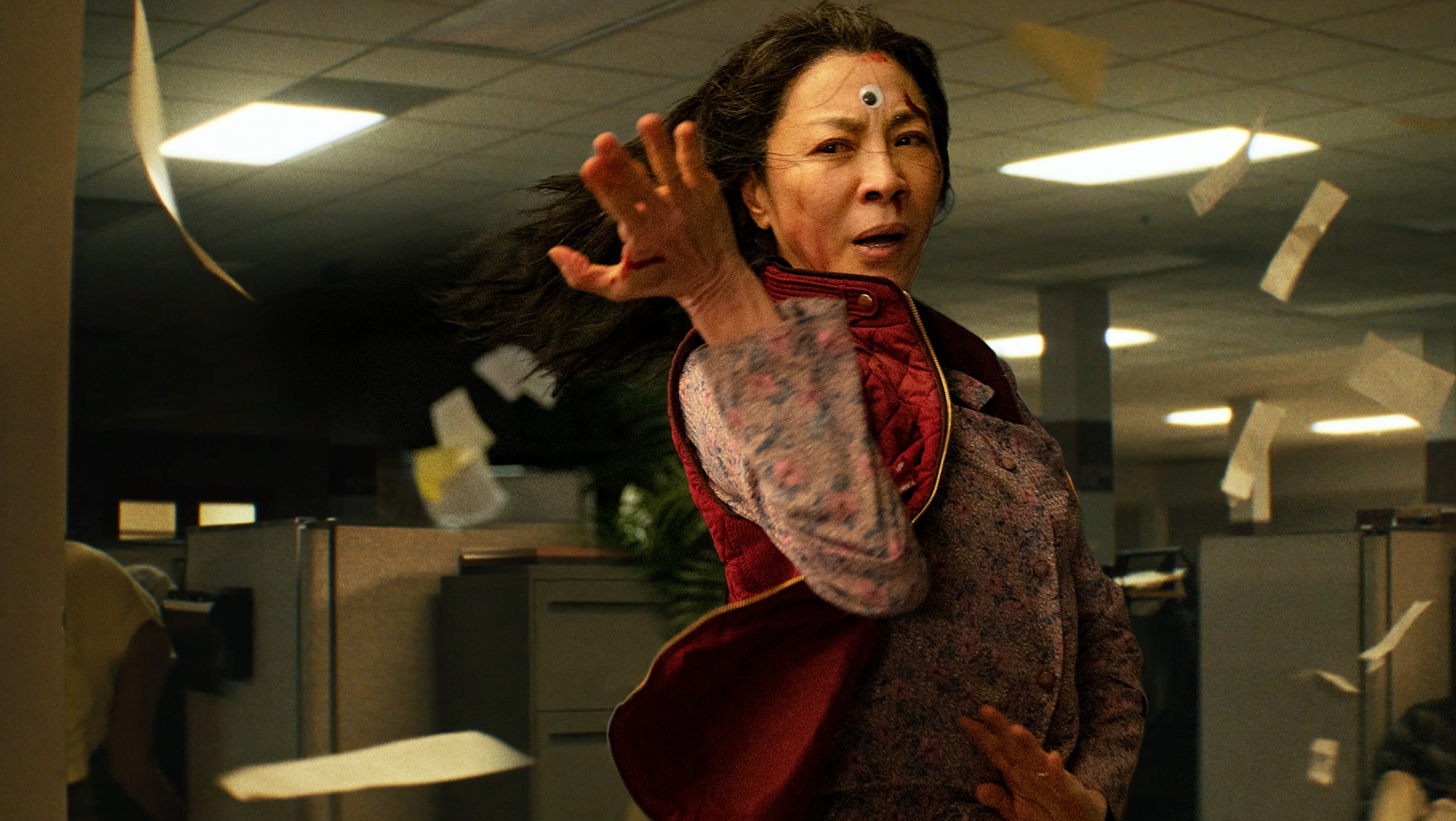Everything Everywhere All at Once: A tale of the Simplest and Queerest of Loves
Written by Harshit Bhatt
Every once in a while, a piece of work comes along, something that truly brings to the light the existence of the cosmos to the forefront for its spectators, something that breaks you, exhausts you, and yet in the end, you find yourself simply content and grateful that you got to look at something of this grandeur. Everything Everywhere and All at Once is all of this and then some more.
The movie, led by the fabulous Michelle Yeoh, under the creative supervision of the directorial duo of Daniels, and divided into three parts named in the title of the film itself- ‘Everything,’ ‘Everywhere’, and ‘All at Once,’ presents its viewers with a simple concept told through the hula hoops of the modern sci-fi tropes. The premise is set in a very conventional immigrant setting: a Chinese mother and father operating a small business, taking care of an elderly father, all the while fussing over their daughter’s lesbian identity. Evelyn Wang (Michelle Yeoh) and her husband Waymond Wang (Ke Huy Quan) find their biggest problem to be the Income Tax audit they have coming up, only to realize that it is the gateway to get sucked into a mind-bending whirlwind of cosmic chaos.
Though the summarization of the movie is almost impossible, this author, therefore, will try her best to give you her analysis. The first part, also being the longest part, titled ‘Everything,’ sets the notion of the abstract idea of the ‘road not taken’ very straightforwardly to its audience. The concept of the multiverse, though usually seen in the Marvel and DC comics, puts forth the possibilities of having different versions of the same person in all the different universes, who may have started from the same point in their lives but made different choices.
There is a version of Evelyn that was prolifically trained in martial arts and went on to become a cinematic legend, and then there is a version of her character that became a chef. There is also a version who had hot dogs for fingers and lives with the same IRS bureaucrat (Jamie Lee Curtis) who audited her laundromat. The main drama, however, comes back to the familial domain of a mother-daughter equation and how the daughter’s Queerness causes this utter annihilation of her mother’s universe.
Joy, Evelyn’s daughter, played by the show-stealing Stephanie Hsu, is an openly gay woman living the current twenty-first-century ideals of life. Her life, outside of her conventional Chinese immigrant parents’ house is probably brimming with colors of Pride and gender fluidity, yet unlike her glee-inducing name, it is the family house that her story is set and explored. One must also pay close attention to the idea of Joy’s alter ego, Jobu Tupaki’s depiction as the main villain or the great evil that must be eradicated is completely twisted and leaves the climax of the movie at a peak when during the early revelation of Jobu Tupaki leads Evelyn to shout in horror, “You’re why Joy thinks she’s gay.”
Tupaki’s response to that accusation is just as hilarious in her bedazzled Elvis Jumpsuit, but I shall leave that for you to explore on your own. The movie’s eventual resolution comes to the mundane realization in both the mother and daughter, that one must simply choose the choices they are making, especially when concerning a loved one, from a place of love and affection in their heart, not from a place of age-old prejudice and shame. The movie also includes a lot of Asian symbols, one being the googly eyes that Waymond plays with childishly, becoming almost like a third eye that helps Evelyn see her surroundings from a different perspective.
This movie has almost everything for everyone. Lauded by a worldwide audience, winning Yeoh her first Golden Globe and making her the first Asian woman to be nominated in the best actress category at the 2023 Oscars, Everything Everywhere All at Once gives you just right balanced taste of convention and rebellion with a kick of genre-bending chaotic queerness. Stephanie Hsu also has been nominated in the Best supporting actress category at the Oscars, bringing the total to a whopping 11 nominations in almost all the major categories. Though they just might be numbers to some of us, it really does bring to mind how different these award categories look than they did just a decade or two back. The film holds a 95% rating on Rotten Tomatoes if you still need some convincing.


